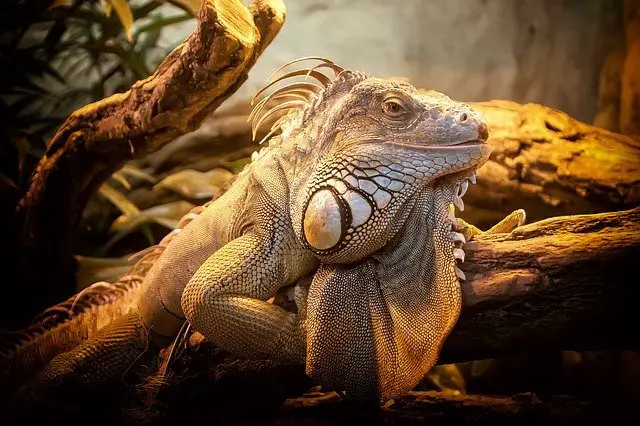Finding the right pet to fit your lifestyle can be tricky, especially if you are always on the go. High-maintenance pets, like cats and dogs, require daily attention and feeding. If you find yourself longing for companionship at home but know you need the freedom to stay away for a day or two, or maybe even three, then a reptile might be your pet.
Many adult reptiles don’t require daily feeding. Reptiles that don’t need to be fed daily include leopard geckos, corn snakes, blue tongue skinks, black and white Argentine tegus, savanna monitor lizards, and crested geckos.
The Leopard Gecko
The leopard gecko has an excellent personality for first-time pet owners. It’s a smaller reptile that will only grow about 8 to 12 inches. These little reptiles can live up to 20 years, so ensure you’re in it for the long haul.
Leopard geckos are super easy and inexpensive to feed. They eat feeder crickets, so watching them hunt can be fun.
- Baby leopard geckos under 4 inches need to be fed 5-7 small crickets a day.
- Juvenile leopard geckos need 5-7 small crickets every other day until about 12 months.
- Adult leopard geckos need about 6 or 7 crickets 2 to 3 times a week.
The Corn Snake
This notoriously docile snake is another unique introductory reptile. Corn snakes reach about 5 feet when fully grown and can live 15 to 20 years.
Corn snakes have a diet consisting mainly of live mice; the frequency and amount vary slightly as they grow.
- Baby corn snakes should be fed one pinkie mouse every 5 to 7 days.
- Adult corn snakes need to eat 1 or 2 mice every 5 to 7 days.
The Blue Tongue Skink
This lizard is considered friendly by most reptile specialists. They tend to get attached to their owners, will grow to about 24 inches, and have a lifespan of 15 to 20 years.
As with other reptiles, food frequency varies as they grow, but even juveniles only require feeding every other day.
- Juvenile blue-tongued skinks should be fed every other day.
- Adult blue-tongued skinks require food every 2 to 3 days.
Bluetongue skinks are omnivores, so they eat a variety of different things. A blue tongue skink needs a diet consisting of 40% protein, 50% vegetables, and 10% fruit. An easy option for blue tongue skinks is wet cat or dog food, but you can also feed them a mix of animal protein (meat or eggs), leafy greens, and a variety of fruit.
The Black and White Argentine Tegu
This one might be right up your alley if you’re in the market for a giant pet. The black and white Argentine tegu will grow to over 4 feet long and weigh upwards of 20 pounds. The average lifespan of this tegu is 15 to 20 years.
The tegu’s diet consists of fruit, insects, meat (including frozen mice), and eggs. While the hatchlings will need to eat every day, this changes as they grow.
- Feed hatchlings every day.
- Juveniles can be fed every other day.
- Adults only need to eat every three days.
Be sure to remove any extra food from the tank after every meal.
The Savannah Monitor
Like the argentine tegu, Savannah monitors are on the larger side. They can grow to be 4 to 6 feet and live around 10 to 15 years. While Savannah lizards tend to be more subdued than other monitors, they can still deliver a painful bite and are known to use their nails and long tails as weapons.
If you can get past the possible biting, scratching, and tail whipping, a savannah monitor’s dies is pretty simple. They should be fed gut-loaded insects like cockroaches and grasshoppers. As a treat, you can occasionally feed them a pre-killed mouse.
- Babies and juveniles should be fed five times a week.
- Adult monitors require feedings 2 to 3 times a week.
Don’t forget the tongs! Your monitor might mistake your hand for prey, so hand-feeding is not a good idea.
The Crested Gecko
Crested geckos grow to be 6 to 10 inches and can live for 15 to 20 years. While the crested gecko is a tad skittish, its diet does make it easy to care for.
A crested gecko can be fed a commercial crested gecko food, with live insects like crickets and cockroaches as a supplement.
- Babies and juveniles should be fed daily.
- Adult crested geckos only need to be fed three times a week.
Caring for Your Growing Reptile
No matter which reptile you choose, make sure you have studied up on its care needs. While the snakes on this list do not require daily feeding as adults, it’s essential to meet their dietary needs as they grow.




